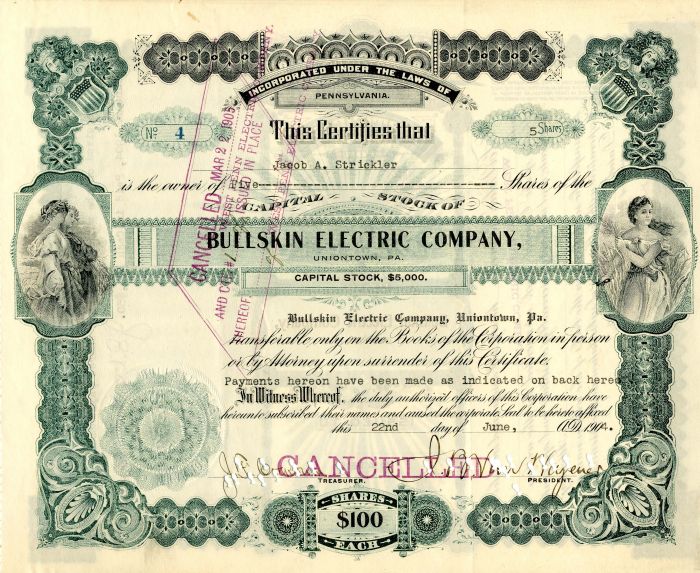Bullskin Electric Co., Uniontown, PA - Stock Certifcate
Inv# US1097 Stock
Stock. Certificate #5!
Uniontown is a city in Fayette County, Pennsylvania, United States, 46 miles (74 km) southeast of Pittsburgh and part of the Greater Pittsburgh Region. The population was 10,372 at the 2010 census, down from 12,422 at the 2000 census. It is the county seat and largest city of Fayette County.
Popularly known as "Beesontown", the "town of Union" was founded by Henry Beeson on July 4, 1776. This was, coincidentally, the same date the United States Declaration of Independence was adopted. The National Road, also known as the Cumberland Road, was routed through Uniontown in the early 19th century, and the town grew along with the road (now US 40). 10 miles (16 km) southeast of Uniontown is Fort Necessity, built by George Washington during the French and Indian War (part of the international Seven Years' War) as well as the site of the Battle of Jumonville Glen, where the North American branch of the war began.
Uniontown's role in the Underground Railroad in the antebellum years is commemorated by a marker on the corner of East Main Street and Baker Alley. Residents helped slaves escaping from the South to freedom.
In the late nineteenth century, the town grew based on the development of coal mines and the steel industry. Uniontown was the site of violent clashes between striking coal miners and guards at the local coke works during the bituminous coal miners' strike of 1894. Fifteen guards armed with carbines and machine guns held off an attack by 1,500 strikers, killing five and wounding eight.
The Columbia Rolling Mill, an iron and steel works, was located in Uniontown from 1887 to 1895. The mill was the town's top industry at that time. During the Coal Boom of the early part of the 20th century, Uniontown was home to at least 13 millionaires, the most (per capita) of any city in the United States. "Coal barons" and Carl Laemmle, the president of Universal Films, sponsored the famous Uniontown Speedway board track from 1916 to 1922. It was a mile and a quarter raceway.
As with most of Western Pennsylvania, Uniontown's economy waned during the region's deindustrialization of the late 20th century, when the steel industry restructured and many jobs went elsewhere, including offshore. This decline continued into the 21st century, and the population is about half its peak of 1940.
The USS Uniontown (PF-65), a Tacoma-class frigate, was named for the city by the United States Navy on August 16, 1944, the only ship to be so named.
In 1967, Uniontown was the birthplace of the McDonald's Big Mac sandwich. In 2007, the Big Mac Museum was opened in North Huntingdon Township in Westmoreland County, to the disappointment of some Uniontown residents. Big Mac Museum Photos According to a McDonald's spokesperson, the decision was based on logistics and access, but Uniontown residents complained in an article that was published in The Herald-Standard.
The Uniontown Downtown Historic District, Gallatin School, John S. Douglas House, John P. Conn House, and Adam Clarke Nutt Mansion are listed on the National Register of Historic Places.
A stock certificate is issued by businesses, usually companies. A stock is part of the permanent finance of a business. Normally, they are never repaid, and the investor can recover his/her money only by selling to another investor. Most stocks, or also called shares, earn dividends, at the business's discretion, depending on how well it has traded. A stockholder or shareholder is a part-owner of the business that issued the stock certificates.










Ebay ID: labarre_galleries